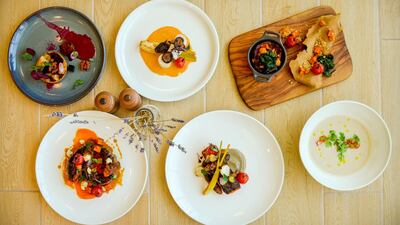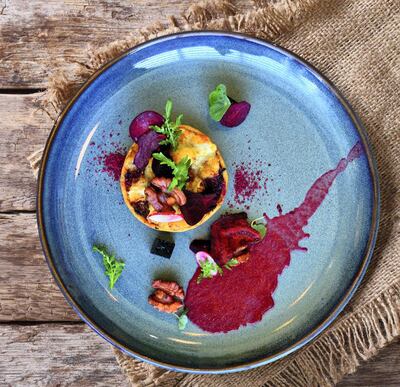Mindful eating has become somewhat of a popular topic, with the term bandied about and used as a synonym for everything from dieting to fantasising about food or personifying it as beloved.
Mindful eating is none of that and so much more than just a passing fad, says Cindy Stocken, who was just about to sit down and mindfully eat some chocolate when we spoke.
You can mindfully eat a quinoa salad, or mindfully eat an ice-cream sundae; it’s not as much what you eat as how and why you eat.
According to Stocken, the co-founder of Mindful Me Dubai, mindful eating is such a practical and enjoyable way to explore our relationship with food, as well as help us savour what we eat.
“This is an especially poignant practice in a world where eating often happens on autopilot – while we stare at screens or even work through our lunch,” she says.
A synonym that does work for mindful eating is simply "awareness". Mitra Shir, a nutritionist based in Vancouver, Canada, who runs the blog and social media account Nutriholist, was an emotional eater before discovering mindfulness.
“What helped the most with my recovery was taking a moment to acknowledge my feelings without any judgment before stuffing my face. Often times I would realise I wasn’t really hungry, and eating only to distract myself from feeling sad or stressed,” she explains.
Mindful eating, she believes, is “the practice of paying attention while eating or drinking without any judgment. Pay attention to what you’re eating – the looks, taste, smell and texture of your food, where it came from, and how nourishing it is,” she says. “It also means being aware of your thoughts and emotions around food and how you feel before, during and after your meals.
Are you eating because you are hungry or simply because you are trying to reduce stress and fill an emotional hole?”
In that sense, mindful eating can help in weight reduction, in changing habits surrounding food, in adopting a healthier lifestyle overall, certainly.
But it’s not a diet, and it’s not about depriving yourself or giving up anything. The truth is, mindful eating is a big leap from counting calories towards experiencing food – and the pleasure of it – more intensely.
You can mindfully eat a burger and enjoy it more than you already do. Or, halfway through, being mindful will make you aware that your body has had enough and actually needs a salad instead.
Maei Jeneidi, a Palestinian-Jordanian mother of two who was born and raised in Abu Dhabi, is adamant mindfulness helped her to lose 16 kilograms and quit smoking.
Originally a translator, Jeneidi now shares her healthy recipes on social media and is attempting to grow her own produce.
Soon, she will launch cooking classes to teach participants everything from where to shop for groceries and how to judge the freshness of your produce and meats, to how to present visually appealing dishes that you can then devour mindfully.
“I am aware of every ingredient I use, and exactly where it comes from,” she says. “For me, it’s not about omitting oil, or saying something is forbidden to me. It’s about harnessing my curiosity about food and about what I’m eating so that I’m completely aware of what I put in my body.”
No more mindless snacking, no more gulping down food, no more buying processed goods or being OK with preservatives. More growing her own produce, eating fruits and vegetables when they are in season and more awareness.
“I think about every single bite I take; that’s how I started,” she says.
How to become a mindful eater
For those who are uncertain about what it takes to be a mindful eater, Shir advises starting out by taking three breaths before each meal.
“Bring all your focus and attention to the moment. Breathe in gratitude for the food in front of you and release any stress or negativity as you exhale,” she says.
“The quality of food and how nourishing it is are also a huge part of mindful eating. I usually won’t recommend a major change in diet, as I believe the key to success is taking small steps.
“Start by including more vegetables, drinking more water, and increasing the number of times you chew your food and incorporate healthier eating and lifestyle habits gradually over time.”
If you’d rather have help, Mindful Me and Mindfulness Dubai host workshops to guide you. Last year, Stocken and her partner, Helen Williams, organised a mindful eating workshop with the help of the Ripe Organic grocery store.
Using plenty of fresh produce, participants made and ate guacamole and learned all about what mindful eating is.
“Our workshops are very conversation-based, very practical. Everyone learns how to tailor mindful eating for their individual needs, whether to deal with anxiety or change, or if they’re grieving, or want to adopt healthier habits,” she says.
It’s a practice that’s especially timely in the region, considering the inflated rates of obesity and diabetes.
Childhood and teenage obesity rates are “unacceptably high” across the UAE, say researchers at Imperial College London and the World Health Organisation (WHO).
Their studies have found that there are 120 million obese children and teenagers worldwide, compared to 11 million just 40 years ago.
And although mindful eating may not be enough as a solution, it’s certainly a start, according to Emma Carbery, the founder of Mindfulness Dubai.
The practice of mindfulness can be transformative, she says, if practised. It helps people raise their levels of self-awareness and self-management and emotional intelligence so they can cope with whatever life throws at them.
“You can describe mindful eating as conscious eating,” says Carbery. “Someone might want to take a mindful approach to eating because for instance they over-eat, so the first thing they are trying to do is gain a greater level of awareness of what they eat, when they eat, and to see whether their eating is triggered by anxiety, or stress, or boredom, or frustrations or a need for avoidance.”
Eat mindfully across the UAE
In the true definition of mindful eating, all food is allowed, anything can be eaten mindfully, pretty much anywhere. As Carbery puts it, "there a huge difference between mindfulness and healthy eating. You could eat a doughnut mindfully".
But if, to you, mindful eating means choosing healthier options and eating only clean eats, where you are aware of the source of every ingredient, then fear not. The options in the UAE are plentiful.
In Abu Dhabi, a favourite for mindful eaters is the Nectar Bar. Mira Naaman, the Lebanese-Canadian who helped to launch Nectar at Abu Dhabi’s Bodytree Studio and propel it from a juice bar into a haven of healthy eats, says mindful eaters will feel right at home there.
“We make healthy eating fun and accessible. It used to have a bad rep of being bland and boring, and we’ve addressed that,” notes Naaman.
For those who want to know exactly what goes into everything they put in their body and its source, a place like Nectar become foolproof. The snacks are made in-house, the smoothies and juices blended right in front of your eyes, all using fresh, seasonal produce.
“When you’re eating something and you know it’s coming from a good source or good place or made with soul, or it’s clean or it’s a treat but a good treat with a lot of thought put into it, that transcends into how much you enjoy it,” Naaman adds.
Likewise at Dubai Eat Well, a relatively new wellness and lifestyle restaurant nestled in the Dubai Herbal and Treatment Centre, the focus is on food made with seasonal ingredients and healthy alternatives devoid of preservatives or additives, says Reji Francis, the restaurant’s food and beverage operations manager.
“Our menus are very transparent and straightforward so that any guest can understand the ingredients, and we also have the option for our guest to know their calorie consumption in every dish,” says Francis.
The food service industry, he says, is these days held accountable when it comes to what is on offer. People have certain lifestyles they want to pursue and a responsible business needs to be aware of that.
“The city has already begun offering numerous restaurants with healthy alternative programmes and options in their menu which is a good thing, challenging us to be better every day when it comes to lifestyle choices and our nutritional and dietary values,” he says.
“This increase in health issues and a rise in more health-conscious restaurants such as our own will hopefully encourage the population to change their habits and follow a healthier lifestyle.”
What’s the point of mindful eating?
More than anything, it’s linked to awareness: whether it’s personal awareness that will help you understand why you are craving something in particular, or what your body needs to feel nourished, or a broader sense of awareness that encompasses the source of your food, and how ethically it was sourced, for example.
Mindful eating teaches you to pay attention to the following:
- Why you feel like eating, and what emotions or needs might be triggering the eating.
- What you’re eating, and whether it’s healthy or not.
- The look, smell, taste and texture of the food you’re eating.
- How it makes you feel as you taste it, as you digest it and throughout the day.
- How sated you feel before, during and after eating.
- Your emotions during and after eating.
- Where the food came from



